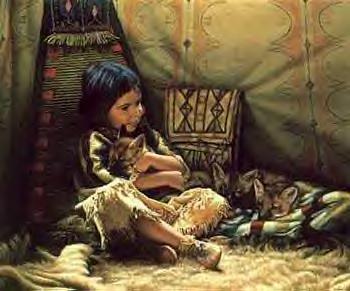|
|
Canku Ota |
|
|
(Many Paths) |
||
|
An Online Newsletter Celebrating Native America |
||
|
November 3, 2001 - Issue 48 |
||
|
|
||
|
Martin Brokenleg Promotes Native American Child-Rearing Philosophies for All Children |
||
|
by Cherryl Jensen Keene Sentinel-October 26, 2001 |
 Keene, NH Traditional
Native American child-rearing practices provide a powerful alternative to the current system of raising and educating
our children, says Martin Brokenleg, professor of Native American studies at Augustana College in South Dakota.
Brokenleg will speak at Keene State College Monday, Oct. 29, at 7 p.m., in the Mabel Brown Room of the Student
Center. He is the author, with colleagues Larry Brendtro and Steve Van Bockern, of the book "Reclaiming Youth
at Risk: Our Hope for the Future." The talk is free and open to the public. Keene, NH Traditional
Native American child-rearing practices provide a powerful alternative to the current system of raising and educating
our children, says Martin Brokenleg, professor of Native American studies at Augustana College in South Dakota.
Brokenleg will speak at Keene State College Monday, Oct. 29, at 7 p.m., in the Mabel Brown Room of the Student
Center. He is the author, with colleagues Larry Brendtro and Steve Van Bockern, of the book "Reclaiming Youth
at Risk: Our Hope for the Future." The talk is free and open to the public. Brokenleg is a member of the Rosebud Sioux Tribe and practices the culture of the Lakota people. He has taught at Augustana since 1974. The book, he explains, combines Native American child-rearing philosophies with contemporary psychological research. "Native Americans have a very high regard for children," he says. "In the Lakota language, the word for child means 'standing sacred.' Children are treated respectfully and there is no punishment. This is in contrast to the Dickensonian approach to child-rearing brought to this country by the English. Adults felt they had to punish children to shape them. "Research tells us clearly that the positive approaches are very effective," Brokenleg adds, "while the negative approaches don't work. Yet our educational system is largely based on the negative approaches." In the book "Reclaiming Youth at Risk," Brokenleg and his co-authors propose a model of youth empowerment called the Circle of Courage. The circle includes four core values that youth must experience: belonging, mastery, independence and generosity. "These are experiences that kids must have," says Brokenleg. "Knowledge can be communicated just through words but children learn and gain strength through experience." Belonging The first value, belonging, is the most crucial, says Brokenleg. "It is the desire to connect with others over our life span. It propels teens and adolescents to join with each other in such artificial ways of belonging like gangs or quick sex. "Belonging should be woven into everything we do," he says. "It should be part of our schools and neighborhoods. When a child is in crisis, school policies should surround young people with belonging. Unfortunately, most (schools) react with 'unbelonging' such as out of school suspension. These reactions don't work and young people become hostile and resistant. We must reassess our philosophies and look for ways to create belonging for our young people." Mastery Mastery, the second value, is the desire to accomplish, says Brokenleg. "It is what schools should excel in. Unfortunately, they seem more interested in failure. Look at how teachers correct papers -- they only mark the faults or mistakes, and in red ink. We need to tell young people what they have done well." The value of mastery comes from the Native American communal life, says Brokenleg. "Every person is respected for what they do," he says. "It is never competitive. In a connected community, everyone congratulates those who achieve. Everyone wants everyone to succeed." Independence Independence, the third value, is not self-sufficiency, says Brokenleg. "It is being responsible for oneself. The real tool for achieving independence is discipline. It is clear that discipline and punishment are antithetical. Discipline is educational; it teaches a person how to be responsible. Punishment carries with it the notion of revenge. "We don't want our children to be obedient," he says. "We want them to be responsible. We want them to make the right decisions when we aren't looking." Brokenleg says giving young people real choices and as much power as possible nurtures independence. Generosity The fourth value, generosity, is "the natural human need to be a good person," Brokenleg says. "A life of generosity continually refreshes. It is part of the life experience of any child; it is in them already. "We need to make generosity a regular part of the school experience, to find real needs and help young people fill them, to contribute to the community." More information about Brokenleg's philosophy and book can be found at www.reclaiming.com. His talk is part of a Keene State speakers' series on diverse issues in the classroom. |
|
Augustana College |
|
|
||
|
|
||
| Canku Ota is a free Newsletter celebrating Native America, its traditions and accomplishments . We do not provide subscriber or visitor names to anyone. Some articles presented in Canku Ota may contain copyright material. We have received appropriate permissions for republishing any articles. Material appearing here is distributed without profit or monetary gain to those who have expressed an interest. This is in accordance with Title 17 U.S.C. section 107. | ||
|
Canku Ota is a copyright © 2000, 2001 of Vicki Lockard and Paul Barry. |
||
|
|
|
|
|
The "Canku Ota - A Newsletter Celebrating Native America" web site and its design is the |
||
|
Copyright © 1999, 2000, 2001 of Paul C. Barry. |
||
|
All Rights Reserved. |
||
